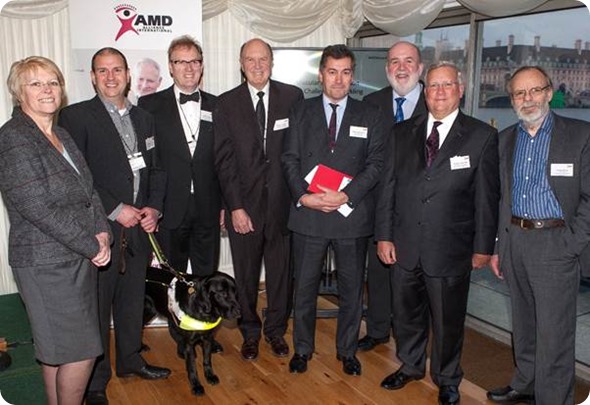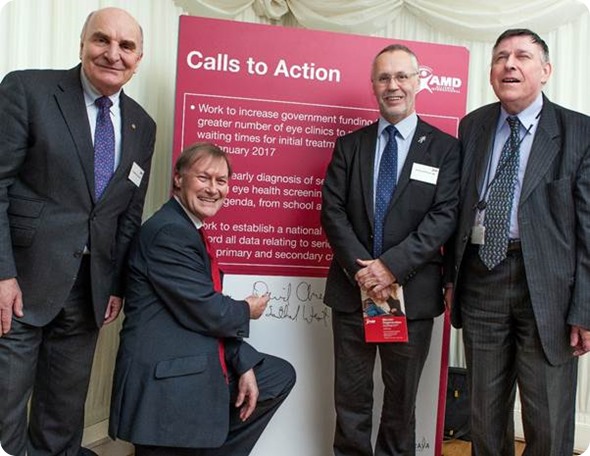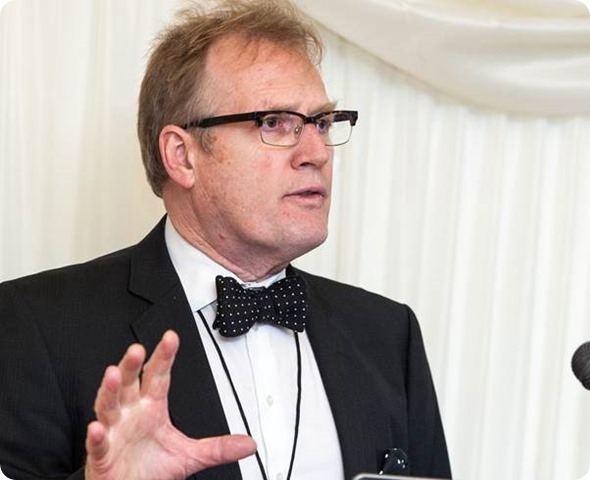“Macular degeneration is not life threatening, but it is life changing,” these were the words of Michael Valenzia, of the Macular Society at the recent House of Commons Reception held by AMD Alliance International.
For me, Michael’s words really put into perspective what life is like when you have macular degeneration, the most common cause of sight loss in the developed world. Imagine not being able to drive, read a book, or even see the faces of loved ones.
Both Michael and Dennis Lewis, Head of Counselling at the Macular Society, shared moving stories of how people with macular degeneration often react to their diagnosis and how it makes many people feel: anxious, afraid, apprehensive that they may become a burden on their families.
Danny Gleeson, Service Delivery Manager at Guide Dogs for the Blind, also shared his personal story. He described how losing his vision had affected different areas of his life including work, hobbies and family relationships. Danny also reinforced how important support is.

From left to right: Ms Lesley-Anne Alexander CBE, Royal National Institute of Blind People, Mr Danny Gleeson, Guide Dogs for the Blind (with Dylan the Guide Dog), Dr Alan Cruess, AMD Alliance International, Dr Keith Gordon, AMD Alliance International, Mr Michael Valenzia, Macular Society, Mr Dennis Lewis, Macular Society, Mr Mark Ackermann, AMD Alliance, Prof Ian Banks, European Forum Against Blindness (EFAB).
One of the key players in UK vision strategy Chief Executive of the Royal National Institute of Blind People (RNIB) Lesley-Anne Alexander, CBE, also revealed some stark statistics: every day 100 people in the UK are told they are going to lose their sight and over 50% of this sight loss is avoidable. She stressed the importance of partnerships to help change this.
Further shocking statistics were revealed by Dr Keith Gordon, VP of Research at the Canadian National Institute for the Blind (CNIB), who stated that age-related macular degeneration (AMD) is now the cause of around 10% of world blindness and whilst dry AMD accounts for around 80% of cases, 90% of vision loss is due to the wet form.
Dr Gordon also touched on how AMD affects people on a personal and social level, highlighting how people with vision loss are twice as likely to suffer a serious fall, they have triple the risk of developing depression and are on average admitted 3 years earlier to long-term care facilities than sighted people.
After outlining some detailed results from the AMD Alliance Study directed by himself and Dr Cruess, Dr Gordon then focussed on the keys to AMD Prevention:
- Regular complete eye examinations
- Good nutrition
- Sun protection – even in winter
- Weight reduction
- Smoking cessation – smokers are 3-4 times more likely to develop AMD
The take-home message of Dr Gordon’s talk: awareness is key to the prevention and management of AMD.
 Awareness was also clearly top of Sir David Amess’ agenda. The MP for Southend West kindly hosted the reception at the House of Commons and outlined the UK government’s position on eye health. He described AMD as a “ticking time-bomb” and hoped that, whatever the outcome of the upcoming election, the government would continue to support the wonderful work being carried out by private companies in the sector including Oraya Therapeutics, who sponsored the event.
Awareness was also clearly top of Sir David Amess’ agenda. The MP for Southend West kindly hosted the reception at the House of Commons and outlined the UK government’s position on eye health. He described AMD as a “ticking time-bomb” and hoped that, whatever the outcome of the upcoming election, the government would continue to support the wonderful work being carried out by private companies in the sector including Oraya Therapeutics, who sponsored the event.
Sir David Amess also outlined and signed three key calls to action:
- Work to increase government funding to enable a greater number of eye clinics to meet the recommended waiting times for initial treatment of wet AMD patients by January 2017
- Enable early diagnosis of serious eye conditions by placing eye health screening at the heart of the primary care agenda, from school age through to later life
- Work to establish a national eye health registry to record all data from both primary and secondary care

From left to right: Stephen Pound MP, Sir David Amess MP, Russell Brown MP and Lord Low sign the Calls to Action.
Dr Alan Cruess, Chairman of Scientific Advisory Panel, AMD Alliance International, provided an overview of the history of therapies, emphasising the enormous progress that has been made over the last decade. He predicted that new technologies, such as Oraya’s, that reduce the treatment burden, will be highly valued by patients and payers alike.

Dr Alan Cruess, Chairman of the Scientific Advisory Board, AMD Alliance International, presented an overview of treatment options available to AMD patients, including Oraya Therapeutics, at the AMD Alliance International’s awareness event, held at the House of Commons.
Finally, Professor Ian Banks, Chairman of the European Forum Against Blindness (EFAB), spoke strongly of how the problem is not that there are too many old people, but that there is not enough investment in old people. He again stressed that 50% of blindness in our society is preventable and that it is criminal negligence that so many people lose their vision when it is preventable.